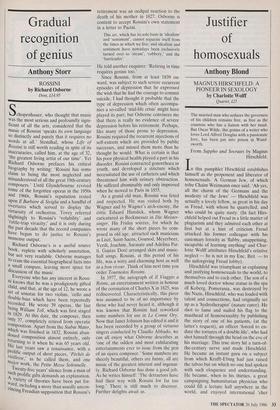Gradual recognition of genius
Anthony Storr
ROSSINI by Richard Osborne Dent, £14.95 Schopenhauer, who thought that music was the most serious and profoundly signi- ficant of all the arts, considered that the music of Rossini 'speaks its own language so distinctly and purely that it requires no words at all.' Stendhal, whose Life of Rossini is still worth reading in spite of its inaccuracies, called him, at the age of 32, the greatest living artist of our time'. Yet Richard Osborne prefaces his critical biography by writing: 'Rossini has some claim to being the most neglected and misunderstood of all the great 19th-century composers.' Until Glyndebourne revived some of the forgotten operas in the 1950s and 1960s, Rossini's reputation rested upon II Barbiere di Siviglia and a handful of overtures which served to display the virtuosity of orchestras. Tovey referred slightingly to. Rossini's 'volubility' and `rattle-trap vivacity;' and it is only during the past decade that the record companies have begun to do justice to Rossini's immense output.
Richard Osborne's is a useful source book, replete with scholarly annotation, but not very readable. Osborne manages to cram the essential biographical facts into a small compass, leaving more space for discussion of the music.
Everyone who has any interest in Rossi- ni knows that he was a prodigiously gifted child, and that, at the age of 12, he wrote a set of sonatas for two violins, 'cello and double-bass which have been repeatedly recorded. He wrote 39 operas, the last being William Tell, which was first staged in 1829. At this date, the composer, then Only 37, completely retired from operatic composition. Apart from the Stabat Mater, Which was finished in 1832, Rossini aban- doned composition almost entirely, only returning to it when he was 65 years old. His last years saw a renaissance, with a prolific output of short pieces, 'Peches de viedlesse,' as he called them, and one major work, the Petite Messe Solennelle. Twenty-five years' silence from a man of such prolific gifts demands an explanation. A variety of theories have been put for- ward, including a more than usually uncon- vincing Freudian supposition that Rossini's
retirement was an oedipal reaction to the death of his mother in 1827. Osborne is content to accept Rossini's own statement in a letter to Pacini.
This art, which has its sole basis in 'idealism' and 'sentiment', cannot separate itself from the times in which we live; and idealism and sentiment have nowadays been exclusively turned over to 'steam', 'robbery,' and the 'barricades'.
He told another enquirer: 'Retiring in time requires genius too.'
Since Rossini, from at least 1839 on ward, was subject to such severe recurrent episodes of depression that he expressed the wish that he had the courage to commit suicide, I had thought it probable that the type of depression which often accompa- nies a so-called 'mid-life crisis' might have played its part; but Osborne convinces me that there is really no evidence of severe depression before his retirement. Perhaps, like many of those prone to depression, Rossini required the recurrent injections of self-esteem which are provided by public successes, and missed them more than he thought he would. What is certain is that his poor physical health played a part in his disorder. Rossini contracted gonorrhoea in youth, and developed a stricture which necessitated the use of catheters and which threatened him with urinary obstruction. He suffered abominably and only improved when he moved to Paris in 1855.
As a grand old man, Rossini was feted and respected. He was visited both by Wagner and by Wagner's arch-enemy, the critic Eduard Hanslick, whom Wagner caricatured as Beckmesser in Die Meister- singer. His Friday soirees, for which he wrote many of the short pieces he com- posed in old age, attracted such musicians as Liszt, Saint-Saens, Gounod, Meyerbeer, Verdi, Joachim, Sarasate and Adelina Pat- ti. Gustav Dore arranged skits and music- hall songs. Rossini, at this period of his life, was a witty and charming host as well as a bon viveur. Think of him next time you order Tournedos Rossini.
In 1977, the autograph of 11 Viaggio a Reims, an entertainment written in honour of the coronation of Charles X in 1825, was rediscovered. Characteristically, this piece was assumed to be of no importance by those who had never heard it, although it was known that Rossini had reworked some numbers for use in Le Comte Ory. Now that Janet Johnson has edited it and it has been recorded by a group of virtuoso singers conducted by Claudio Abbado, we can all enjoy what Osborne describes as `one of the oddest and most exhilarating entertainments ever to issue from the pen of an opera composer.' Some numbers are sheerly beautiful, others are funny, all are music of the greatest interest and ingenui- ty. Richard Osborne has done a good job. As he writes himself: 'The detractors have had their way with Rossini for far too long.' There is still much to discover. Further delights await us.


















































 Previous page
Previous page